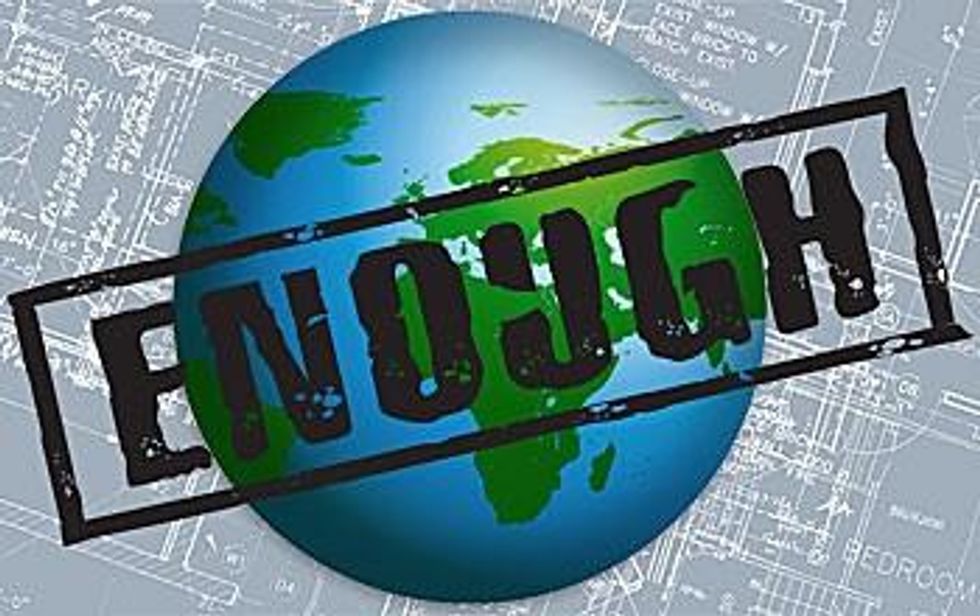What is the purpose of the economy?
When you get down to it, this is the question of our time.
How we answer it determines whether we will be able to sustain civilization as we know it beyond the mid-century.
Yet most of economics concerns itself with what an economy does, not what its goal is or ought to be. For example, much of economic policy can be summed up in the words of Harvard economist, Dani Rodrick, who distilled economic development down to the a three word mantra, "stabilize, privatize and liberalize."
To what end? That question isn't even considered. The implicit assumptions, of course, are maximizing economic growth and creating more wealth.
These two unexamined assumptions are the twin horsemen of the new apocalypse.
People generally have a sense of what is meant by growth, but the concept of what constitutes wealth is a bit more elusive. Most definitions offered by economists can be represented by a statement like this: those material things which are produced by labor, can satisfy human wants, and must have an exchange value. Note that money - or currency - is not wealth in this definition. But, the exchange value we use to measure wealth is money.
Whether that growth is distributed fairly and whether it exceeds the capacity of the environment to sustain, is either assumed away by the Invisible Hand, or dismissed disdainfully by economists as the province of philosophers and other soft academics in squishy social disciplines.
In fact, many economists--schooled by the most popular text in the discipline, Paul Samuelson's Economics, or one of its many newer incarnations--take pride in saying that their discipline is non-normative--that is, amoral. Not immoral, but operating outside the context of values, ethics and morality.
Moreover, because the discipline is intent on being a quantitative science, economics as a field discarded the essence of what an economy should be about in exchange for the ability to "hide in thickets of algebra" as Joan Robinson put it. A classic example of Whitehead's Fallacy of Misplaced Concreteness, in which the abstract ideal is treated as the tangible reality.
For the last 50 years we've been steering our national economy, as well as international economic policy, by this amoral, future blind, compass. No other discipline dominates political theory and practice as much as economics.
Which goes a long way toward explaining exactly why our economy is so unjust and our ecosystem is in imminent danger of collapsing.
Nobel prize winning economist Joseph Stiglitz captured this failure when he said:
We always want to keep in mind what the function, the purpose, of the economy is. [...] the purpose of an economy is not producing GDP. It is increasing the welfare of citizens, and it is increasing the welfare of most citizens. And the American economic system has failed, and failed very badly.
Let's examine the two assumptions: 1) the purpose of an economy is to create more wealth and 2) wealth is measured by currency.
As Robert Costanza pointed out, the annual value of just 17 ecosystem services (PDF) exceeds the value of the entire human economy, yet that value is treated as an externality - that is, these services are not even priced in the market. So our definition of "wealth" leaves out debts that exceed the entire income stream from the human economy.
And Costanza's work was done before we had a good understanding the extent of climate change and the enormous costs it imposes upon us.
So in essence, we are liquidating the real basis of wealth, natural capital, and counting it as wealth creation. So much for wealth.
Now, let's look at currency. As Chris Martenson puts it, money is not wealth, it is merely a claim on wealth. But it can grow indefinitely while the world is finite. So we end up with a claim on wealth that far exceeds any available wealth. Which is debt.
If the function of an economy is merely wealth creation, then we need to redefine wealth, or it is self-terminating. Oh, and it will take us along for the ride.
We can see the bow wave of this destruction with climate change, ocean acidity, accumulated toxins, depleted resources.
The real purpose of an economy has to be something much different that what we use to formulate policy. Joseph Stiglitz' purpose--increasing the welfare of most citizens--had it half right. A billboard spotted in Johannesburg, South Africa during the World Summit on Sustainable Development probably made as good a statement on the appropriate goal of the economy as any: "Enough for everyone, forever."
An economy designed around this goal would look completely different than today's "Everything for a few, right now," economy does.
It would steward ecosystem services and resources using taxes, subsidies, tariffs, and property rights. The idea of distributional equity would not be a blasphemy, but a pragmatic response to the natural tendency of capital to get concentrated in the hands of the few, and a recognition that a market economy can't function without generalized prosperity.
Co-ops and employee-owned companies would be the most common ownership model; CEOs wouldn't get 800 times the minimum wage. There'd be no Bill Gates making some $218,000 and hour. Fossil fuels would be heavily taxed, and the revenue they generated would help fund a low cost transition to a carbon-free economy.
The daily business report would feature an index based on environmental health and resource stocks, not the Dow Jones Index of paper stocks.
But we're not likely to see such an economy. Both major parties are busy trying to maximize paper currency at the expense of natural capital--the source of real wealth.

